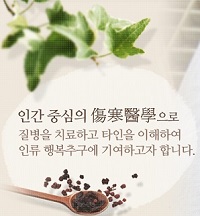 ISSN : 2287-8696
ISSN : 2287-8696
A Case Report of Tinnitus Treated by Socheongryong-tang based on Shanghanlun Provisions
Abstract
- keywords
- Socheongryong-tang, tinnitus, Shanghanlun, disease pattern identification diagnostic system based on Shanghanlun provisions (DPIDS), herbal-formulae medicine.
Reference
1.Kim WB, Seok EJ, Jeon SY, Jeong JK, Lee SI. A review of clinical researches on Socheingryong-tang. Herbal Fomula Science. 2018;26(1):43-57.
2.Yeo SG. Recent pharmacologic treatment for tinnitus. Kyoung HEE tinnitus seminar. 2010:50-63.
3.Heo ES, Hwang CY. A literature study about comparison of eastern-western medicine on the tinnitus. J Korean Med Ophthalmol Otolaryngol Dermatol. 2016;29(4):114-30.
4.Kim JH, Shin Dy, Song JM. A case study of one patient who has the sudden deafness and tinnitus caused by stress. The Journal of Sasang constitutional medicine. 2003;15(2):84-8.
5.Yu MK, Park YH, Kim JH, Park SY, Choi JH. A case study of one Taeeum-person who has tinnitus that is diagnosed as cold turbid phlegm in middle Cho. J Korean Med Ophthalmol Otolaryngol Dermatol. 2005;18(2):99-103.
6.Jo EH, Park MC, Cho NG. Clinical study on a case of objective tinnitus. Korean Journal of Oriental Physiology & Pathology. 2005;19(3):826-9.
7.Kim SJ, Lee H. A clinical case study on the tinnitus with sudden sensorineural hearing loss. Communication of Daejeon Korean Medicine Hospital, Daejeon University. 2007;16(1):1-7.
8.Choi WJ, Kim MD. A clinical case report of a tinnitus patient in pregnancy. J Korean Med Ophthalmol Otolaryngol Dermatol. 2010;23(2):282-23.
9.Kim HJ, Jo AR, Kim CH. A clinical case report of a tinnitus after head trauma. J Korean Med Ophthalmol Otolaryngol Dermatol. 2011;24(2):111-8.
10.Lee CW, Kang JY, Lee SH, Kim CH. A case report of tinnitus with sudden sensorineural hearing loss treated with melonis calyx vomiting therapy. J Korean Med Ophthalmol Otolaryngol Dermatol. 2015;28(4):186-95.
11.Jo HR, Hwangbo M. Four cases of tinnitus with sudden sensorineural hearing loss treated by Daehamhyung-tang. J Korean Med Ophthalmol Otolaryngol Dermatol. 2015;28(3):145-60.
12.Lee SJ, Lim JE. A diagnostic system and clinical application based on six meridian patterns and provisions. KMediACs publishing house. 2013.
13.Kim DD. A study on the naming of 'A diagnostic system based on Shanghanlun six meridian patterns and provisions' and suggestion. Journal of Korean Medical Association of Clinical Sanghan-Geumgwe. 2013;5(1):19-29.
14.Lee SJ, Heo J. A case report of tinnitus treated by Gyejigagalgeun-tang. Journal of Korean Medical Association of Clinical Sanghan-Geumgwe. 2015;7(1):15-20.
15.Jo GM. A case report of tinnitus with panic disorder treated by Daehamhyung-tang from the disease pattern identification diagnostic system based on Shanghanlun provisions. Journal of Korean Medical Association of Clinical Sanghan-Geumgwe. 2016;8(1):109-19.
16.Lee SI. Comparison of Shanghanlun. 1st edition KMediACs publishing house. 2015:198,206.
17.Seo ES, Hwang CY, Lim KS, Kang HW, Park MC, et al. A study on the correlation between health related quality of life(QOL) and the severity of tinnitus patients. J Korean Med Ophthalmol Otolaryngol Dermatol. 2012;25(4):45-56.
18.Back MJ, Hwang MS. Handicap of tinnitus and quality of life in tinnitus patients. Clinical otolaryngology. 2002;13(1):50-5.
19. Kang BC. Today's diagnosis and treatment. 37th rev. ed. Han Woo Ri. 1999:250.
20. Robert E. Rakel. Rakel's Family medicine. 8th rev. ed. MD World. 2013:363.
21. Catholic Univ. Medical school ENT classroom. Otolaryngology head & neck surgery·ENT:Clinical Practice Guideline. 1st rev. ed. Gunja Publishing, Inc. 2011:613-9.
22. Shin MS, Seong AK. Literature survey on etiology and pathogenesis of tinnitus and its treatment with acupuncture and moxibustion. Daejeon Univ. Inst of Orental Med collected papers. 1994;3(1):157-80.
23.Kim HJ, Kim JH, Chae BY. A literatural consideration on tinnitus aerium. J Korean Med Ophthalmol Otolaryngol Dermatol. 1990;3(1):99-107.
24.Lee JY, Roh SS. Listeratural consideration on the classification of cause and treatment of tinnitus. J Korean Med Ophthalmol Otolaryngol Dermatol. 1992;5(1):45-59.
25.Ahn SH, Lee KN, A listeratural study on tinntus causes and characteristics and prescription drugs. Wonkwang Univ collected papers. 1980;6(1):143-62.
26.Kim GJ. A study on the quality of life by Jangsang’s relational analysis and Byunjeung’s type according to tinnitus’s aspect. J Korean Med Ophthalmol Otolaryngol Dermatol. 2017;30(3):20-30.
27.Kim GJ. Analysis of tinnitus pattern by visceral pattern identification and treatment efficiensy by pattern identification type. J Korean Med Ophthalmol Otolaryngol Dermatol. 2019;32(3):77-86.
28.Rho YB, Lee JH, Ha HI. The fundamental meaning of Mai and Shanghanlun provisions based on paleography. Journal of Korean Medical Association of Clinical Sanghan-Geumgwe. 2015;7(1):1-14.
29.Kook YB, Kim SC, Park SD, Park SK, Seo BI, Seo YB, Shin SS, Lee SI, Lee KH, Jeong JG, Ju YS, Choi HY. Formula study. Younglimsa. 2006 : 78-9.
31.Bae HB, Yoon HJ, Ko WS. A clinical study on solar urticaria improved with Socheonngryong-tang. J Korean Med Ophthalmol Otolaryngol Dermatol. 2019;32(3):262-8.
32.Cho SH, Choi WY. Two case reports treated with Jeodang-tang based on Shanghanlun provisions. Journal of Korean Medical Association of Clinical Sanghan-Geumgwe. 2019;11(1):46-61.
33.Ha YH, Lee SJ, Lee SI. Diagnostic of chest bind in GanPyeongShanghanlun 15 letters provision. Journal of Korean Medical Association of Clinical Sanghan-Geumgwe. 2018;10(1):1-21.
34.Newman CW, Jacobson GP, Spitzer JP. Development of the tinnitus handicap inventory. Arch Otolaryngol Head Neck Sug. 1996;122:143-8.
- Downloaded
- Viewed
- 0KCI Citations
- 0WOS Citations

